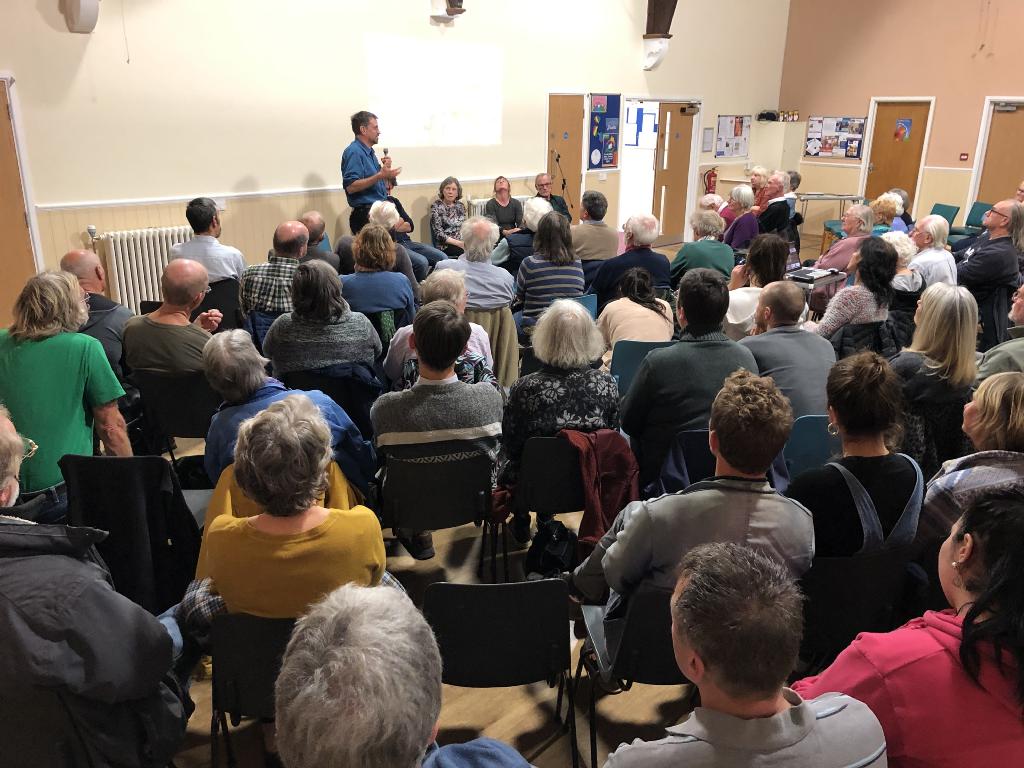
BEXHILL ENVIRONMENTAL GROUP
Talk on What's a good diet for people
30th October 2019
HOME PAGE
BEG/REG Talk: What’s a good diet for people and planet?
Industrialisation and an ever increasing population has drastically altered food production. Geof Rayner PhD, formerly with the Centre for Food Policy and a government advisor on obesity, held 80 people’s attention at our combined Bexhill and Rother Environmental Groups talk last Wednesday in Bexhill.
Effects of Industrialisation
Geof explained that, prior to the industrial revolution, most food was produced and consumed locally. The local natural limits of food production restricted the global population to 1 billion in 1800. Industrial progress broke this limitation and helped increase the movement and availability of food across large areas. Farm production increased through mechanisation and imported fertilisers. Diets gradually improved and people now are taller and live longer.
Feeding and housing growing populations has led to adverse effects on the environment. Intense farming practises are reducing wildlife diversity and accelerating climate change through, for example, deforestation.
Concentrations of the greenhouse gas carbon dioxide in the atmosphere have increased from 290 parts per million before the industrial revolution to more than 400 ppm now. Global emissions of CO2 in 2011 were 150 times higher than in 1850. UK agriculture generates 13% of our greenhouse gas emissions - second only to the energy industry. Considerable research is being done to understand greenhouse gases emitted or absorbed by agriculture and what action can be taken to reduce it. Large scale intensive cattle and poultry farms also use lots of antibiotics to maintain heathy animals.
Here in the UK we are offered a wide variety of healthy foods and many of us benefit from a much healthier and varied diet compared with those who lived in the past. Interestingly the average EU household spent 30% of its budget on food pre 1960 and now only 15%. Geof challenged us to whether this demonstrates the little importance we now give to the production of sustainable food. However, limited disposable income or poor health education means that some suffer poor diet or food poverty, an increasing number of us suffer from being overweight or obese.
Our Common Agricultural Policy now supports more environmental farming methods, reduces competition from non-ethical suppliers overseas and helps maintain farm incomes. However, agriculture only employs 1% of the UK workforce whereas food processing and retail employ 13%. The dominance of the big supermarkets and their high volume, low cost supply chains has contributed to the UK being heavily reliant on food imports while our farms rely on subsidy. Local food production only meets a small niche demand. The power to set prices has moved away from producers to brands with large marketing budgets. Shockingly, the advertising budget of Coca Cola for the year 2011 was similar to the whole budget spent by the World Health Organisation.
The last 50 years has seen trends towards eating more complex processed foods high in sugar, fat and salt. We tend to snack more and consume more sugary drinks and this can have adverse effects on our general health. We also eat more individually rather than together as a family.
What Can be Done
Geof explained how to improve our health and that of the planet by supporting sustainable farming practises, sustainable supply chains together with reductions in social and economic inequalities
.
Farming practice should reduce greenhouse gas emissions, improve soil quality, adopt better fertilizer management, encourage ecological diversity and minimise the impact on our natural environment.
Supply chains should minimise food waste and packaging, consciously reduce their greenhouse gas emissions, improve labelling to include ecological costs and give greater priority to seasonality and domestically produced foods.
Monitoring of obese and overweight school children should be re-introduced together with sufficient resources to integrate food and cooking tuition in the curriculum. Government should incentivise healthy food purchase while placing levies on unhealthy foods.
Panel of Experts
Dan Ford introduced the healthy lifestyle service called One You East Sussex which is free to residents of East Sussex and offers help and advice on stopping smoking, drinking less alcohol, losing weight, eating well etc.
Abby Nicol described the Pea Pod Veg organic market garden based near Hailsham that supplies seasonal fresh veg boxes to local customers.
Dominic Manning explained the Rye Food and Wildlife Community Garden maintained by local volunteers, some of whom do not have access to a garden of their own.
The audience put questions to the 4 speakers including how to set up a community garden, challenges of the regions farmers, soil quality, complexity of food labelling and work on diabetes.
They summarised that we could all try to:
Reduce our consumption of meat, fish, salt, sugar, snacks and processed food,
Increase the amount of fruit and veg and seasonal locally sourced food
Enjoy what we eat, preparing it and understanding the ingredients how the food we consume effects both us and our planet.
Industrialisation and an ever increasing population has drastically altered food production. Geof Rayner PhD, formerly with the Centre for Food Policy and a government advisor on obesity, held 80 people’s attention at our combined Bexhill and Rother Environmental Groups talk last Wednesday in Bexhill.
Effects of Industrialisation
Geof explained that, prior to the industrial revolution, most food was produced and consumed locally. The local natural limits of food production restricted the global population to 1 billion in 1800. Industrial progress broke this limitation and helped increase the movement and availability of food across large areas. Farm production increased through mechanisation and imported fertilisers. Diets gradually improved and people now are taller and live longer.
Feeding and housing growing populations has led to adverse effects on the environment. Intense farming practises are reducing wildlife diversity and accelerating climate change through, for example, deforestation.
Concentrations of the greenhouse gas carbon dioxide in the atmosphere have increased from 290 parts per million before the industrial revolution to more than 400 ppm now. Global emissions of CO2 in 2011 were 150 times higher than in 1850. UK agriculture generates 13% of our greenhouse gas emissions - second only to the energy industry. Considerable research is being done to understand greenhouse gases emitted or absorbed by agriculture and what action can be taken to reduce it. Large scale intensive cattle and poultry farms also use lots of antibiotics to maintain heathy animals.
Here in the UK we are offered a wide variety of healthy foods and many of us benefit from a much healthier and varied diet compared with those who lived in the past. Interestingly the average EU household spent 30% of its budget on food pre 1960 and now only 15%. Geof challenged us to whether this demonstrates the little importance we now give to the production of sustainable food. However, limited disposable income or poor health education means that some suffer poor diet or food poverty, an increasing number of us suffer from being overweight or obese.
Our Common Agricultural Policy now supports more environmental farming methods, reduces competition from non-ethical suppliers overseas and helps maintain farm incomes. However, agriculture only employs 1% of the UK workforce whereas food processing and retail employ 13%. The dominance of the big supermarkets and their high volume, low cost supply chains has contributed to the UK being heavily reliant on food imports while our farms rely on subsidy. Local food production only meets a small niche demand. The power to set prices has moved away from producers to brands with large marketing budgets. Shockingly, the advertising budget of Coca Cola for the year 2011 was similar to the whole budget spent by the World Health Organisation.
The last 50 years has seen trends towards eating more complex processed foods high in sugar, fat and salt. We tend to snack more and consume more sugary drinks and this can have adverse effects on our general health. We also eat more individually rather than together as a family.
What Can be Done
Geof explained how to improve our health and that of the planet by supporting sustainable farming practises, sustainable supply chains together with reductions in social and economic inequalities
.
Farming practice should reduce greenhouse gas emissions, improve soil quality, adopt better fertilizer management, encourage ecological diversity and minimise the impact on our natural environment.
Supply chains should minimise food waste and packaging, consciously reduce their greenhouse gas emissions, improve labelling to include ecological costs and give greater priority to seasonality and domestically produced foods.
Monitoring of obese and overweight school children should be re-introduced together with sufficient resources to integrate food and cooking tuition in the curriculum. Government should incentivise healthy food purchase while placing levies on unhealthy foods.
Panel of Experts
Dan Ford introduced the healthy lifestyle service called One You East Sussex which is free to residents of East Sussex and offers help and advice on stopping smoking, drinking less alcohol, losing weight, eating well etc.
Abby Nicol described the Pea Pod Veg organic market garden based near Hailsham that supplies seasonal fresh veg boxes to local customers.
Dominic Manning explained the Rye Food and Wildlife Community Garden maintained by local volunteers, some of whom do not have access to a garden of their own.
The audience put questions to the 4 speakers including how to set up a community garden, challenges of the regions farmers, soil quality, complexity of food labelling and work on diabetes.
They summarised that we could all try to:
Reduce our consumption of meat, fish, salt, sugar, snacks and processed food,
Increase the amount of fruit and veg and seasonal locally sourced food
Enjoy what we eat, preparing it and understanding the ingredients how the food we consume effects both us and our planet.
